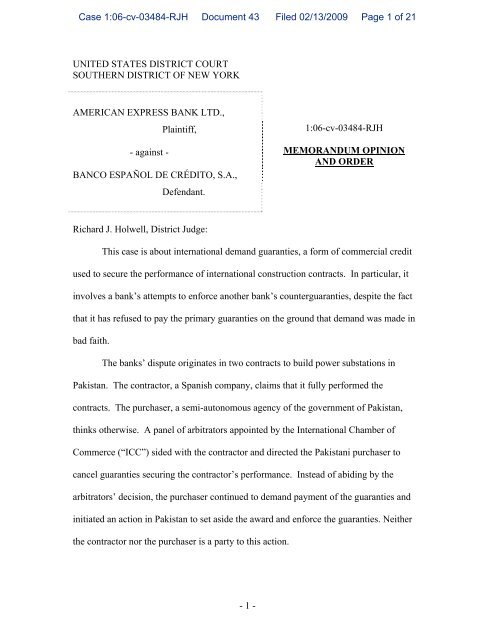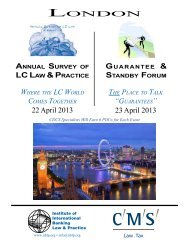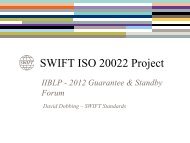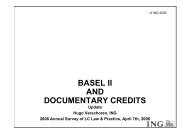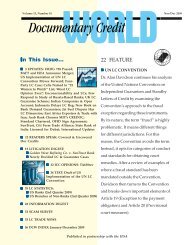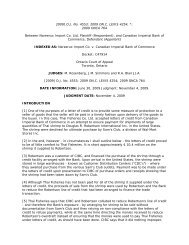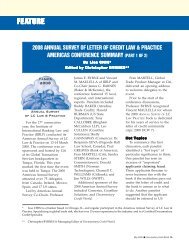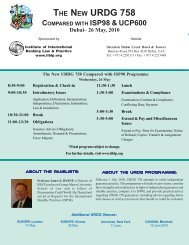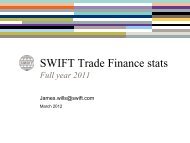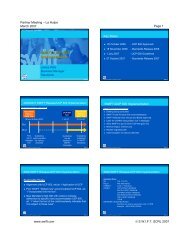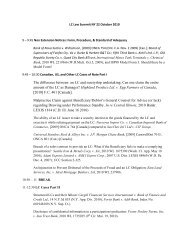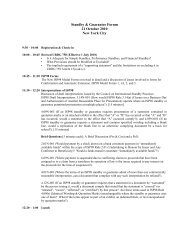American Express Bank Ltd. v. Banco Espanol de Credito, S.A
American Express Bank Ltd. v. Banco Espanol de Credito, S.A
American Express Bank Ltd. v. Banco Espanol de Credito, S.A
Create successful ePaper yourself
Turn your PDF publications into a flip-book with our unique Google optimized e-Paper software.
Case 1:06-cv-03484-RJH Document 43 Filed 02/13/2009 Page 1 of 21UNITED STATES DISTRICT COURTSOUTHERN DISTRICT OF NEW YORKAMERICAN EXPRESS BANK LTD.,Plaintiff,- against -BANCO ESPAÑOL DE CRÉDITO, S.A.,Defendant.1:06-cv-03484-RJHMEMORANDUM OPINIONAND ORDERRichard J. Holwell, District Judge:This case is about international <strong>de</strong>mand guaranties, a form of commercial creditused to secure the performance of international construction contracts. In particular, itinvolves a bank’s attempts to enforce another bank’s counterguaranties, <strong>de</strong>spite the factthat it has refused to pay the primary guaranties on the ground that <strong>de</strong>mand was ma<strong>de</strong> inbad faith.The banks’ dispute originates in two contracts to build power substations inPakistan. The contractor, a Spanish company, claims that it fully performed thecontracts. The purchaser, a semi-autonomous agency of the government of Pakistan,thinks otherwise. A panel of arbitrators appointed by the International Chamber ofCommerce (“ICC”) si<strong>de</strong>d with the contractor and directed the Pakistani purchaser tocancel guaranties securing the contractor’s performance. Instead of abiding by thearbitrators’ <strong>de</strong>cision, the purchaser continued to <strong>de</strong>mand payment of the guaranties andinitiated an action in Pakistan to set asi<strong>de</strong> the award and enforce the guaranties. Neitherthe contractor nor the purchaser is a party to this action.- 1 -
Case 1:06-cv-03484-RJH Document 43 Filed 02/13/2009 Page 2 of 21In this dispute between the banks, the Court holds that: (1) the guaranties andcounterguaranties are governed by letter-of-credit law; (2) in light of the final, bindingICC award, the guarantor, plaintiff <strong>American</strong> <strong>Express</strong> <strong>Bank</strong> (“AEB”), has no obligationto pay un<strong>de</strong>r its guaranties and, therefore, no good faith basis to <strong>de</strong>mand payment of thecounterguaranties issued by <strong>Banco</strong> Español <strong>de</strong> Crédito (“Banesto”); and (3) AEB’srequest for a <strong>de</strong>claration that it will be entitled to payment in the event that it iscompelled at some future date to pay in Pakistan is not presently justiciable. AEB’scomplaint is therefore dismissed without prejudice to the filing of a new action followingfurther <strong>de</strong>velopments in Pakistan.I. BACKGROUNDThe history of this case is long and spans four jurisdictions. The Court recountsonly enough of it to explain the basis for the current <strong>de</strong>cision. In doing so, the Courtaccepts as true the factual allegations of the complaint, see, e.g., City of New York v.Smokes-Spirits.Com, Inc., 541 F.3d 425, 432 (2d Cir. 2008); relies on undisputed factscontained in public records, see, e.g., Blue Tree Hotels Inv. (Canada), <strong>Ltd</strong>. v. StarwoodHotels & Resorts Worldwi<strong>de</strong>, Inc., 369 F.3d 212, 217 (2d Cir. 2004); and makesadditional findings of fact necessary to <strong>de</strong>termine whether the Court has subject matterjurisdiction, see, e.g., Kamen v. Amer. Tel. & Tel. Co., 791 F.2d 1006, 1011 (2d Cir.1986).A. The Un<strong>de</strong>rlying ContractsIn April and July 1995, Isolux Wat S.A. (“Isolux”) and the Pakistan Water andPower Development Authority (“WAPDA”) entered into two contracts for theconstruction of electrical substations in Pakistan. (See Isolux Wat, S.A. (Spain) v.- 2 -
Case 1:06-cv-03484-RJH Document 43 Filed 02/13/2009 Page 3 of 21Pakistan Water & Power Dev. Auth. (Pakistan), ICC Case No. 13158/KGA, at 2 (Feb. 6,2007) (“ICC Award”), Cadarso Decl. Ex. B.; Terms of Reference, Isolux Wat, S.A.(Spain) v. Pakistan Water & Power Dev. Auth. (Pakistan), ICC Case No. 13158/KGA, at2 (Oct. 22, 2004) (“Terms of Reference”), Walker Decl. Ex. C.) Isolux is a Spanishengineering and construction company. (ICC Award 2.) WAPDA is a semi-autonomousagency of the government of Pakistan, which is responsible for coordinatinginfrastructure <strong>de</strong>velopment schemes in the water and power sectors. (WAPDA, TheAuthority, http://www.wapda.gov.pk/htmls/auth-in<strong>de</strong>x.html (last visited Nov. 7, 2008).)The contracts required Isolux to install two 220/132 KV substations (the numbersrefer to voltage), and to supply and install telecommunication equipment for twentylower voltage peripheral grid stations. (ICC Award 2.) In exchange, WAPDA apparentlyagreed to pay Isolux about $35 million. (See ICC Award 11.) In the event of a dispute,the parties agreed to submit their claims to arbitration at the ICC. (See ICC Award 2.)The arbitration clause provi<strong>de</strong>d that “any difference, dispute or question arising out of orwith reference to this agreement which cannot be settled amicably . . . shall within 60days from the date that either party informs the other in writing that such difference[,]dispute or question exists, be referred to arbitration of three arbitrators.” (Id.) The clausefurther provi<strong>de</strong>d that “[t]he award of the majority of the [arbitrators] shall be final andbinding on both parties.” (Id.)- 3 -
Case 1:06-cv-03484-RJH Document 43 Filed 02/13/2009 Page 4 of 21B. The Guaranties and CounterguarantiesTo secure Isolux’s performance, WAPDA required Isolux to obtain two <strong>de</strong>mandguaranties. 1Such guaranties, which are common in international construction contracts,provi<strong>de</strong> a simple way for a buyer to obtain cash for substitute performance if a contractor<strong>de</strong>faults. (See generally David J. Barru, How to Guarantee Contractor Performance onInternational Construction Projects: Comparing Surety Bonds With <strong>Bank</strong> Guaranteesand Standby Letters of Credit, 37 Geo. Wash. Int’l L. Rev. 51 (2005).) Isolux asked<strong>de</strong>fendant Banesto to arrange the guaranties. (See Compl. Ex. 1.) Banesto in turn askedAEB, the plaintiff here, to execute guaranties in favor of WAPDA in Lahore, Pakistan.(See id.) This kind of arrangement is also common, since buyers frequently prefer towork with local banks, such as the AEB branch in Pakistan, instead of unfamiliar foreigninstitutions. (See generally John F. Dolan, The Law of Letters of Credit: Commercial andStandby Credits 1.03[1], at 1-16 (Rev. Ed. 1996) (“Dolan”).) The AEB branch inPakistan agreed to issue guaranties to WAPDA, provi<strong>de</strong>d that Banesto issuecounterguaranties in its favor.The following diagram summarizes the legal relationships between WAPDA,Isolux, and the banks. The instruments at issue in this action appear in bold:1 The record contains many variations on the spelling of “guaranty” and “guaranties.”The Court uses the <strong>American</strong> spelling without intending any change in meaning.- 4 -
Case 1:06-cv-03484-RJH Document 43 Filed 02/13/2009 Page 5 of 21BanestoCounterguarantiesAEBCommercial banking relationshipGuaranties (on construction contracts)IsoluxConstruction contractsWAPDAFigure 1Banesto and AEB ma<strong>de</strong> arrangements for the guaranties in a series of SWIFTmessages sent in November 1995. 2On November 16, Banesto sent AEB a messageasking that it issue two guaranties in WAPDA’s favor, both for a total of U.S.$1,778,571.50 and 5,486,500 Pakistani rupees. (Compl. Ex. 1.) The critical un<strong>de</strong>rtakingsin the guaranties provi<strong>de</strong>d:the surety [i.e., AEB] waiving all objections and <strong>de</strong>fences un<strong>de</strong>r the aforesaidcontract, hereby irrevocably and in<strong>de</strong>pen<strong>de</strong>ntly guarantee[s] to pay to WAPDAwithout <strong>de</strong>lay upon WAPDA’s first written <strong>de</strong>mand any amount claimed byWAPDA upto [sic] the sum named herein, against WAPDA’s written <strong>de</strong>clarationthat the principal [Isolux] has refused or failed to perform the aforementionedcontract. (Compl. Ex. 1 (capitalization normalized).)2 The acronym stands for “Society for Worldwi<strong>de</strong> Interbank FinancialTelecommunication,” a cooperative society organized un<strong>de</strong>r Belgian law. SWIFToperates a secure, worldwi<strong>de</strong> financial messaging network that banks use to do businesswith one another. (See SWIFT, About SWIFT,http://www.swift.com/in<strong>de</strong>x.cfm?item_id=41322 (last visited Nov. 7, 2008).)- 5 -
Case 1:06-cv-03484-RJH Document 43 Filed 02/13/2009 Page 6 of 21AEB, in other words, agreed to pay WAPDA un<strong>de</strong>r the guaranties based on a writtencertification that Isolux had failed to perform. For its part, Banesto agreed to repay anyliabilities AEB incurred un<strong>de</strong>r the guaranties. Specifically, Banesto’s messages to AEBpromised, in banker’s pidgin, that “Our counterguarantee irrevocable unconditional inyour favour is valid to receive your eventual claims ma<strong>de</strong> un<strong>de</strong>r your guarantee that weun<strong>de</strong>rtake to pay to you on your first <strong>de</strong>mand notwithstanding any contestation from us orour applicants part [sic] or third party.” (Id. (capitalization normalized).)On November 30, 1995, AEB executed the guaranties. (Compl. Ex. 2.) AtBanesto’s request, the guaranties’ expiration dates were exten<strong>de</strong>d from time to time, mostrecently until September 30, 2004. (Compl. Ex. 3.)C. Contract DisputesBy 2004, disputes arose regarding Isolux’s performance of the contracts andWAPDA’s concomitant payment obligations, the <strong>de</strong>tails of which are unimportant here.(See generally ICC Award 2, 11-16.) The disputes provoked legal proceedings in fourjurisdictions: Switzerland, Spain, Pakistan, and the United States. Since 2004, however,neither AEB nor Banesto has paid anyone a cent. (See Compl. 14; Pl.’s Mem. in Supp.of Summ. J. 9 n.6 (“Pl.’s First Mem.”).)Legal proceedings began on February 11, 2004, when Isolux submitted a requestfor arbitration to the ICC International Court of Arbitration. (Terms of Reference 2.)Isolux’s request sought money damages and an or<strong>de</strong>r requiring WAPDA to return all theguaranties issued in connection with the construction contracts. (ICC Award 13.) At thesame time that Isolux submitted a request for arbitration, it obtained an injunction from aSpanish court to freeze the status quo. The injunction (1) enjoined WAPDA from- 6 -
Case 1:06-cv-03484-RJH Document 43 Filed 02/13/2009 Page 7 of 21<strong>de</strong>manding payment on the AEB guaranties, and (2) directed Banesto not to honor anyrequests for payment of any guaranties or counterguaranties related to the constructioncontracts. (See Auto [Court Or<strong>de</strong>r], Juzgado <strong>de</strong> 1° Instancia N° 42, Madrid (Feb. 2004),Walker Decl. Ex. H, at 4).)Five months later, WAPDA informed AEB that Isolux had failed to performed theun<strong>de</strong>rlying contracts and <strong>de</strong>man<strong>de</strong>d payment of AEB’s guaranties. Without having paidthe guaranties, AEB on July 15 and July 16, 2004 sent Banesto SWIFT messages<strong>de</strong>manding payment of the counterguaranties. (Compl. 12-13; see Aff. of FarhadSubjally Ex. 5.) Banesto refused, citing the Spanish injunction. (See Compl. 14; Letterfrom Antonio Ortega Suárez, International Energy Manager, Isolux Wat, S.A. toWAPDA (Aug. 6, 2004), Walker Decl. Ex. I.)In February 2005, WAPDA filed a lawsuit against AEB in Lahore, Pakistan torecover on the guaranties. (See Summons and Compl., Pakistan Water & PowerDevelopment Authority v. <strong>American</strong> <strong>Express</strong> <strong>Bank</strong>, <strong>Ltd</strong>., Civil Suit No. 30 of 2005(Lahore High Court Feb. 10, 2005), Ex. B to Letter from Stephen Marzen to Hon.Richard J. Holwell (June 1, 2007).) The complaint alleged that Isolux failed to performthe construction contracts (id. 10-13), that WAPDA had ma<strong>de</strong> <strong>de</strong>mand on theguaranties (id. 16), and that AEB had wrongfully refused to honor them (id. 19). Asrelief, WAPDA <strong>de</strong>man<strong>de</strong>d damages in the amount of the guaranties, plus the costs of suit.(Id. at 4-5.)In March 2006, an arbitral hearing was held in Geneva, Switzerland. (SeeProcedural Or<strong>de</strong>r No. 4, Arbitration Between Isolux and WAPDA, ICC Case No.- 7 -
Case 1:06-cv-03484-RJH Document 43 Filed 02/13/2009 Page 8 of 2113158/KGA (Jan. 5, 2006) (Walker Decl. Ex. J at 9).) Both Isolux and WAPDAparticipated fully in the proceeding. (See, e.g., ICC Award, at 17, 19, 25.)Before the arbitral panel issued its <strong>de</strong>cision, AEB on May 8, 2006 filed suitagainst Banesto in the Southern District of New York. In its complaint, AEB alleged thatBanesto breached its agreement to pay AEB un<strong>de</strong>r its counterguaranties, and that Banestobreached the terms and conditions of an account agreement governing a U.S. dollaraccount Banesto maintained with AEB. (Compl. 20, 22.) AEB <strong>de</strong>man<strong>de</strong>d damages inthe amount of the counterguaranties, plus the costs of enforcement. (Id. at 4-5). OnAugust 16, 2006 AEB moved for summary judgment, and on September 15 2006 Banestomoved to dismiss the complaint. In light of the pending <strong>de</strong>cision by the ICC arbitralpanel, the Court dismissed both motions without prejudice to refiling once a <strong>de</strong>cision hadbeen issued by the ICC panel. (See Or<strong>de</strong>rs dated March 22, 2007 and April 5, 2007.)D. The Arbitral Decision and Subsequent Proceedings in PakistanWhile not communicated to this Court in a timely fashion, the ICC tribunal hadissued its <strong>de</strong>cision on February 6, 2007. The <strong>de</strong>cision or<strong>de</strong>red that (1) Isolux payWAPDA U.S. $196,116.92 and 892,589 rupees; (2) WAPDA pay Isolux 60,632,495.86rupees; and (3) WAPDA cancel a large number of guaranties and performance bonds,among them the guaranties at issue here. (ICC Award 92-93 & annex 1, at 4.). Un<strong>de</strong>r the<strong>de</strong>cision, which called for setoffs to be calculated at the exchange rate prevailing on thedate of the award, WAPDA owed Isolux approximately $788,066. Isolux owed WAPDAnothing. According to a report submitted by Banesto and not contested by AEB, theaward became final and binding as a matter of Swiss law upon notification to the parties.- 8 -
Case 1:06-cv-03484-RJH Document 43 Filed 02/13/2009 Page 9 of 21(Letter from Dr. Michael Schöll to Álvaro López <strong>de</strong> Argumedo & Dorieta Vicente, at 2-3(Mar. 5, 2007), Cadarso Decl., Ex. C.)Un<strong>de</strong>terred by the arbitral <strong>de</strong>cision, WAPDA continued its efforts to enforce theguaranties in Pakistan. By letter dated May 29, 2007, AEB informed this Court that“WAPDA . . . is not abiding by the award, including the direction to release theguaranties of <strong>American</strong> <strong>Express</strong> <strong>Bank</strong>, and has filed a proceeding in Pakistan to have theaward set asi<strong>de</strong>.” (Letter from David Rabinowitz to Hon. Richard J. Howell (May 29,2007).) In its <strong>de</strong>fense of that action, AEB specifically claims that (1) WAPDA’s<strong>de</strong>mands for payment of the guaranties are mala fi<strong>de</strong> (in bad faith), and (2) AEB has noobligation to pay WAPDA. (See Def.’s Application Un<strong>de</strong>r Section 10 of the FinancialInstitutions (Recovery of Finances) Ordinance, 2001, Pakistan Water and Power Dev.Auth. (WAPDA) v. <strong>American</strong> <strong>Express</strong> <strong>Bank</strong> <strong>Ltd</strong>., Lahore, Civil Suit No. 30 of 2005(Lahore High Court Mar. 8, 2005), Ex. C to Letter from Stephen Marzen to Hon. RichardJ. Holwell (June 1, 2007).)On May 29, 2007, the parties renewed their motions for summary judgment anddismissal in this Court. (See Letter from David Rabinowitz to Hon. Richard J. Holwell(May 29, 2007); Supp. Mem. of Law in Supp. of Mot. to Dismiss of Def. <strong>Banco</strong> Español<strong>de</strong> Crédito, S.A. (“Def.’s Third Mem.”)) In the most recent round of briefing, AEBclaims a right to immediate payment of the counterguaranties regardless of whether it haspaid WAPDA and <strong>de</strong>spite its refusal to do so. (Id.) In the alternative, AEB contends it isentitled to a <strong>de</strong>claration that if a Pakistani court requires it to pay the principal guaranties,Banesto must pay its counterguaranties. (See Pl.’s Supp. Mem. in Further Opp. to Mot.to Dismiss, at 5 (“Pl.’s Third Mem.”).) Banesto disputes both claims. Thus, the principal- 9 -
Case 1:06-cv-03484-RJH Document 43 Filed 02/13/2009 Page 10 of 21issues now before the Court are whether, on the current record, AEB has a right toenforce AEB’s counterguaranties even though it has not paid the principal guaranties, or,alternatively, to a <strong>de</strong>claration that if it is or<strong>de</strong>red to pay the guaranties by a Pakistanicourt, it will be entitled to repayment.II.DISCUSSIONThe Court holds that AEB is not entitled to immediate payment of thecounterguaranties or a <strong>de</strong>claration of its future rights. Before consi<strong>de</strong>ring the merits ofAEB’s claims, however, two threshold issues must be addressed.A. Choice of Forum LawFirst, the parties dispute which forum’s law governs AEB’s claims to paymentun<strong>de</strong>r the counterguaranties. Citing an account agreement executed in New York an<strong>de</strong>vi<strong>de</strong>nce that Banesto and AEB have an “integrated global relationship,” AEB arguesthat New York law should apply. (See Pl.’s First Mem. 3-5; Pls.’ Mem. in Further Supp.of Mot. for Summ. J. and in Opp. to Mot. to Dismiss 3-4 (“Pl.’s Second Mem.”).)Banesto thinks that Spanish law applies, or that if New York law applies, it is not subjectto any liabilities here that it would not also be subject to in Spain. (See Mem. of Law inSupp. of Mot. to Dismiss & in Opp. to Summ. J. 14, 20-21 (“Defs.’ First Mem.”).)In light of the conclusions the Court reaches below, there is no need to resolvethis issue now. The complaint and the three memoranda of law submitted by AEBassume that New York law applies. If the complaint does not state a claim un<strong>de</strong>r NewYork law, it necessarily fails to state a claim upon which relief can be granted andBanesto’s motion to dismiss must be granted. For the purposes of the pending motions,the Court will therefore assume that New York law applies.- 10 -
Case 1:06-cv-03484-RJH Document 43 Filed 02/13/2009 Page 11 of 21B. Choice of Substantive LawNext, the parties dispute whether AEB’s guaranties and Banesto’scounterguaranties, assuming New York law applies, are subject to letter-of-credit law,particularly Article 5 of the New York Uniform Commercial Co<strong>de</strong>. Banesto contendsthat AEB’s guaranties are “functionally and legally equivalent” to international letters ofcredit, and thus subject to letter-of-credit law. (Def.’s First Mem. 15.) AEB counters thatthe instruments are simple contracts, not subject to Article 5. (See Pl.’s First Mem. 5.)The practical significance of the dispute is that if letter-of-credit law applies, Banesto cantake advantage of the “material fraud” exception recognized in Article 5. See N.Y.U.C.C. § 5-109 (McKinney 2006). The Court agrees with Banesto, and holds that boththe guaranties and the counterguaranties are governed by letter-of-credit law.By way of background, the typical letter-of-credit transaction involves three legalrelationships: (1) an un<strong>de</strong>rlying contractual relationship between the party that obtainsthe letter of credit (the “applicant”) and the party entitled to draw on it (the“beneficiary”); (2) a relationship between the party that issues the letter of credit (the“issuer”) and the applicant concerning the terms and amount of the credit; and (3) arelationship between the issuer and the beneficiary, which “embod[ies] the issuer’scommitment to ‘honor drafts or other <strong>de</strong>mands for payment presented by the beneficiaryor a transfer beneficiary upon compliance with the terms and conditions specified in thecredit.’” Nissho Iwai Europe PLC v. Korea First <strong>Bank</strong>, 782 N.E.2d 55, 59 (N.Y. 2002)(quoting First Commercial <strong>Bank</strong> v. Gotham Originals, 475 N.E.2d 1255, 1258 (1985)).See also 3Com Corp. v. <strong>Banco</strong> do Brasil, S.A., 171 F.3d 739, 741 (2d Cir. 1999)(<strong>de</strong>scribing same relationships).- 11 -
Case 1:06-cv-03484-RJH Document 43 Filed 02/13/2009 Page 12 of 21In a standard “commercial” letter of credit, the issuer un<strong>de</strong>rtakes to pay thepurchase price of goods upon receiving the seller’s invoice and other documentsevi<strong>de</strong>ncing a right to payment. See Dolan, 3.04-3.05, at 3-18 to 3-22. A “standby”letter of credit differs with respect to the documents necessary to draw on the credit.Unlike a commercial letter, a standby typically does not require the presentation of anegotiable bill of lading or other transport document; instead, the beneficiary may collectsimply by certifying that the applicant failed to perform its un<strong>de</strong>rlying contractualobligations. See Dolan 3.06, at 3-23.Both standby and commercial letters of credit create “an obligation whollyin<strong>de</strong>pen<strong>de</strong>nt of the un<strong>de</strong>rlying commercial transaction.” 3Com, 171 F.3d at 744. Thisfeature of letters of credit, known as the “in<strong>de</strong>pen<strong>de</strong>nce principle,” has been termed a“fundamental principle” of the law of credits. Id. Because of this principle, it isordinarily enough to present documents that strictly comply with the terms of a letter ofcredit to draw on it.The guaranties and counterguaranties at issue in this case share this essentialfeature of in<strong>de</strong>pen<strong>de</strong>nce from the un<strong>de</strong>rlying contractual relationships, and, therefore, aregoverned by letter-of-credit law. In the guaranties, AEB “irrevocably and in<strong>de</strong>pen<strong>de</strong>ntlyguarantee[d] to pay to WAPDA without <strong>de</strong>lay upon WAPDA’s first written <strong>de</strong>mand anyamount claim by WAPDA.” (Compl. Ex. 1.) In the counterguaranties, Banestoun<strong>de</strong>rtook to pay AEB “on [its] first simple <strong>de</strong>mand which shall be final and conclusive.”(Id.) These provisions plainly reflect the parties’ expectation that WAPDA wouldreceive money promptly if it submitted a facially valid certification that Isolux failed toperform its obligations—a <strong>de</strong>fining characteristic of standby letters of credit.- 12 -
Case 1:06-cv-03484-RJH Document 43 Filed 02/13/2009 Page 13 of 21Beyond this, a leading treatise on the law of credits favors treating instrumentssuch as the ones at issue here as letters of credit. See Dolan, 1.05[2], at 1-31. As thetreatise explains, “foreign banks and foreign branches of domestic banks have introduceda product that they call a ‘guarantee’ (sic) and to which letter of credit law is quitecongenial. ‘First-<strong>de</strong>mand guarantees,’ ‘performance guarantees,’ and ‘simple-<strong>de</strong>mandguarantees’ are the foreign bank equivalents of the standby.” Id.Lastly, at least one <strong>de</strong>cision of a United States Court of Appeals supports theconclusion that the guaranties and counterguaranties are governed by letter-of-credit law.In Banque Paribas v. Hamilton Industries International, Inc., 767 F.2d 380 (7th Cir.1985), the Seventh Circuit consi<strong>de</strong>red a guaranty that, like the ones here, securedperformance of a construction contract. 3Judge Posner’s opinion for the court labeled theguaranty an “international letter of credit” and applied letter-of-credit law. See id. at 381;384-86. As the district court in Paribas noted, letter-of-credit law applied because theissuer agreed to pay the beneficiary upon its presentation of a facially valid documentary<strong>de</strong>mand for payment, and <strong>de</strong>scribed its obligations as “unconditional and irrevocable.”Amer. Nat. <strong>Bank</strong> & Trust Co. of Chicago v. Hamilton Indus., Intern., Inc., 583 F. Supp.164, 169-170 (N.D. Ill. 1984), rev’d on other grounds, 767 F.2d 380 (7th Cir. 1985). Sotoo here.3 The critical un<strong>de</strong>rtakings in the guarantee provi<strong>de</strong>d: “we the Guarantor herebyunconditionally agrees [sic] to pay to you forthwith following <strong>de</strong>mand ma<strong>de</strong> by you inwriting (which writing shall refer to the number and date of this letter of guarantee) to ouragent [and] the Guarantor’s Agent must receive your written <strong>de</strong>mand hereun<strong>de</strong>r withinthe period of the effectiveness of this letter of guarantee[.]” Banque Paribas, 767 F.2d at382.- 13 -
Case 1:06-cv-03484-RJH Document 43 Filed 02/13/2009 Page 14 of 21Without citation to judicial authority, AEB contends that the absence of expressconditions requiring “documentary presentation” in Banesto’s counterguaranties takes thecounterguaranties out of letter-of-credit law. (See Pl.’s Second Mem. 8; N.Y. U.C.C. § 5-102(a)(10) (McKinney 2001) (“‘Letter of credit’ means a <strong>de</strong>finite un<strong>de</strong>rtaking . . . tohonor a documentary presentation by payment or <strong>de</strong>livery of an item of value.” (emphasisad<strong>de</strong>d)).) AEB’s argument, however, ignores the un<strong>de</strong>rtakings in the principal guarantieswhereby AEB agreed to pay WAPDA “upon [its] first written <strong>de</strong>mand.” (Compl. Ex. A.)Since the principal guaranties and the counterguaranties were transmitted to AEB in anintegrated document (a SWIFT message), the Court finds it rather obvious that Banestointen<strong>de</strong>d the counterguaranties, like the guaranties, to be nothing more than documentarycredits.C. MeritsTurning to the merits, AEB contends that it is entitled to immediately enforce thecounterguaranties, and to a <strong>de</strong>claration setting out Banesto’s liabilities in the event that itpays WAPDA pursuant to a Pakistani court or<strong>de</strong>r. Neither contention has merit.1. AEB Has No Basis To Immediately Enforce the CounterguarantiesTaking a somewhat extreme view of the in<strong>de</strong>pen<strong>de</strong>nce principle, AEB firstmaintains that it is entitled to draw on the counterguaranties regardless of its obligation topay WAPDA. (See Pl.’s Third Mem. 1; Pl.’s First Mem. 6.) The flaw in this argument isobvious: In view of the ICC award—and as a question of basic contract law,international law, and New York law—WAPDA’s continued <strong>de</strong>mands for payment of theguaranties lack any basis in law or fact. Thus, until the award is modified or vacated,neither WAPDA nor AEB has a “colorable right” to <strong>de</strong>mand honor of the guaranties orcounterguaranties. See N.Y. U.C.C. § 5-109 official cmt. 1.- 14 -
Case 1:06-cv-03484-RJH Document 43 Filed 02/13/2009 Page 15 of 21First, as for contract: The construction contracts’ arbitration clause provi<strong>de</strong>s that“[t]he award of the majority of the [arbitrators] shall be final and binding on bothparties.” (ICC Award 2.) Cf. Synergy Gas Co. v. Sasso, 853 F.2d 59, 63-64 (2d Cir.1988) (noting that un<strong>de</strong>r Fe<strong>de</strong>ral Arbitration Act, the “scope of authority of arbitratorsgenerally <strong>de</strong>pends on the intention of the parties to an arbitration, and is <strong>de</strong>termined bythe agreement or submission”). WAPDA participated fully in the ICC arbitration, andlost. And the parties here have ma<strong>de</strong> no suggestion that there is a colorable ground forvacating the award. In short, on the record before the Court, WAPDA’s continued<strong>de</strong>mands for payment are flatly inconsistent with its contractual obligations.Second, as for international law: In 2005, Pakistan ratified the New YorkConvention on the Recognition and Enforcement Arbitral Awards, 21 U.S.T. 2517, 330U.N.T.S. 38 (“N.Y. Conv.”). See United Nations Commission on International Tra<strong>de</strong>Law, 1958 Convention on the Recognition and Enforcement of Foreign Arbitral Awards– the “New York” Convention, http://tinyurl.com/7hsxx4 (last visited Jan. 21, 2009)(noting Pakistan’s date of ratification). Though the convention does not expressly speakto the res judicata effect of an international arbitral award, Stavros Brekoulakis, TheEffect of an Arbitral Award and Third Parties in International Arbitration: Res JudicataRevisited, 16 Am. Rev. Int’l Arb. 177, 181 (2005), it reflects the principle that until it issuccessfully challenged, an arbitral award presumptively establishes the rights andliabilities of the parties to the arbitration. Specifically, the convention provi<strong>de</strong>s thatsubject to its enforcement provisions, “[e]ach Contracting State shall recognize arbitralawards as binding and enforce them in accordance with the rules of procedure of theterritory where the award is relied upon.” N.Y. Conv. art. 3. WAPDA’s continued- 15 -
Case 1:06-cv-03484-RJH Document 43 Filed 02/13/2009 Page 16 of 21<strong>de</strong>mands for payment of AEB’s guaranties are inconsistent these international lawobligations as well.Finally, as for New York law: Since at least 1980, New York courts haverecognized that a final and conclusive international arbitral award is res judicata as to aparty that fully participated in the proceeding. See Guard-Life Corp. v. S. ParkerHardware Mfg. Corp., 406 N.E.2d 445, 452 (N.Y. 1980). To the extent that the bonafi<strong>de</strong>s of WAPDA’s and AEB’s <strong>de</strong>mands for payment are judged un<strong>de</strong>r New York law,the ICC award preclu<strong>de</strong>s WAPDA’s continuing <strong>de</strong>mands for payment.Thus, un<strong>de</strong>r multiple bodies of law, the ICC award presumptively establishes therights and liabilities of WAPDA and AEB until such time as WAPDA succeeds in havingthe award modified or vacated by a court. AEB, moreover, recognizes this. In Pakistan,it has argued that all disputes arising out of the construction contracts are to be settled inarbitration; that WAPDA’s <strong>de</strong>mands for payment un<strong>de</strong>r the guaranties were ma<strong>de</strong> in badfaith; and that it has no obligation to pay WAPDA anything. (See Def.’s ApplicationUn<strong>de</strong>r Section 10 of the Financial Institutions (Recovery of Finances) Ordinance, 2001,Pakistan Water and Power Dev. Auth. (WAPDA) v. <strong>American</strong> <strong>Express</strong> <strong>Bank</strong> <strong>Ltd</strong>., Lahore,Civil Suit No. 30 of 2005, at 3 (Lahore High Court Mar. 8, 2005), Ex. C to Letter fromStephen Marzen to Hon. Richard J. Holwell (June 1, 2007) (“The two claims . . . lodgedby the Plaintiff on the Defendant were . . . mala fi<strong>de</strong> and not maintainable.”); id. at 7(“The dispute between the Plaintiff and Isolux Wat including the issue whether there hasbeen any <strong>de</strong>fault, breach or failure on the part of the contractor will be <strong>de</strong>ci<strong>de</strong>d inarbitration which is the forum mutually agreed between the Plaintiff and the Contractor . .. .”).) By <strong>de</strong>manding immediate payment un<strong>de</strong>r the counterguaranties, however, AEB- 16 -
Case 1:06-cv-03484-RJH Document 43 Filed 02/13/2009 Page 17 of 21seeks to have things both ways. Refusing to recognize the validity of WAPDA’s claimsin Pakistan, AEB argues in this Court that those very claims (and the remote possibilitythat a Pakistani court will recognize them at some point in the in<strong>de</strong>finite future, see infra§ II.C.2) justify its <strong>de</strong>mand for immediate honor of the counterguaranties.Whether or not AEB is estopped from taking an inconsistent position here, itsposition in Pakistan better reflects the legal relationships at the heart of this case. AEBhas no obligation to pay un<strong>de</strong>r its guaranties and, therefore, no good faith basis to<strong>de</strong>mand payment of the counterguaranties issued by Banesto. It follows that, on thecurrent record, Banesto’s refusal to honor AEB’s <strong>de</strong>mands for honor is proper. BrenntagIntern. Chems., Inc. v. <strong>Bank</strong> of India, 175 F.3d 245, 250 (2d Cir. 1999); Recon/Optical,Inc. v. Gov’t of Israel, 816 F.2d 854, 858 (2d Cir. 1987); Ground Air Transfer, Inc. v.Westates Airlines, Inc., 899 F.2d 1269, 1273-74 (1st Cir. 1990); Roman Ceramics Corp.v. Peoples Nat. <strong>Bank</strong>, 714 F.2d 1207, 1213 (3d Cir. 1983).2. AEB Is Not Entitled to Declaratory ReliefAnticipating this conclusion, AEB points out that there is nothing illegitimateabout WAPDA’s efforts to have the arbitral award vacated in Pakistan. It thus arguesthat “to avoid possible future circularity of payment,” the Court should issue a <strong>de</strong>clarationthat AEB will be entitled to payment if it is or<strong>de</strong>red to pay WAPDA by a Pakistani court.(Pl.’s Third Mem. 5.)The first half of this argument is sound. Though WAPDA’s continued <strong>de</strong>mandsfor payment are unjustified in view of the ICC award, nothing in the award or the law ofjudgments preclu<strong>de</strong>s WAPDA from un<strong>de</strong>rtaking legal efforts to have the award vacated.In<strong>de</strong>ed, though the question is not yet presented, the Court is preliminarily of the viewthat if AEB pays WAPDA because it has been or<strong>de</strong>red to do so by a Pakistani court,- 17 -
Case 1:06-cv-03484-RJH Document 43 Filed 02/13/2009 Page 18 of 21Banesto will be un<strong>de</strong>r an obligation to reimburse it. In such circumstances, AEB couldmake a good faith <strong>de</strong>mand for honor of the counterguaranties, as the presumption ofvalidity that attaches to the arbitral award would no longer be conclusive. And even ifthe counterguaranties could not be enforced because of the Spanish injunction, Banestolikely would have an in<strong>de</strong>pen<strong>de</strong>nt obligation to reimburse AEB by virtue of havingprocured the guaranties from AEB. Cf. N.Y. U.C.C. § 5-108(i)(1) (“An issuer that hashonored a presentation as permitted or required by this article . . . is entitled to bereimbursed by the applicant in immediately available funds not later than the date of itspayment of funds . . . .”).It does not follow, however, that AEB currently is entitled to a <strong>de</strong>claration of itsfuture rights. The Declaratory Judgment Act, 28 U.S.C. § 2201, provi<strong>de</strong>s that “In a caseof actual controversy within its jurisdiction . . . any court of the United States . . . may<strong>de</strong>clare the rights and other legal relations of any interested party seeking such<strong>de</strong>claration . . . .” The act does not expand the constitutional limitations on fe<strong>de</strong>raljudicial power. Ashwan<strong>de</strong>r v. Tennessee Valley Authority, 297 U.S. 288, 325 (1936).Instead, an action for a <strong>de</strong>claratory judgment can be maintained only if a case presents ajusticiable controversy un<strong>de</strong>r Article III of the Constitution, meaning among other thingsthat “[c]laims based merely upon ‘assumed potential invasions’ of rights are not enoughto warrant judicial intervention.” Id. (quoting Arizona v. California, 283 U.S. 423, 462(1931)).When a controversy <strong>de</strong>pends on a future or contingent event, these limitations callfor careful analysis of whether the dispute presents an “actual controversy.” On onehand, the simple fact that a liability is contingent “does not necessarily <strong>de</strong>feat jurisdiction- 18 -
Case 1:06-cv-03484-RJH Document 43 Filed 02/13/2009 Page 19 of 21of a <strong>de</strong>claratory judgment action.” Associated In<strong>de</strong>m. Corp. v. Fairchild Indus., Inc., 961F.2d 32, 35 (2d Cir. 1992) (dictum). If however “the contingent event upon which thecontroversy rests is unlikely to occur, the controversy lacks ‘sufficient immediacy andreality’ to warrant <strong>de</strong>claratory relief.” In re: Pru<strong>de</strong>ntial Lines, Inc., 158 F.3d 65, 70 (2dCir. 1998).A good example is Certain Un<strong>de</strong>rwriters at Lloyd’s, London v. St. Joe MineralCorp., 90 F.3d 671 (2d Cir. 1996). There, several London-market insurers sought a<strong>de</strong>claration setting limits on their liability after the Environmental Protection Agencynamed the insured a “Potentially Responsible Party” at twenty sites contaminated withtoxic waste. See id. at 672-73. Because there were substantial questions about whetherthe insured would ever be held liable by the EPA, the court conclu<strong>de</strong>d the case was notyet “justiciable and ripe.” Id. at 676 (quoting Certain Un<strong>de</strong>rwriters at Lloyd’s, London v.St. Joe Minerals Corp., 889 F. Supp. 65, 67 (N.D.N.Y. 1995)). The court noted: “therecord as a whole consists in large measure of speculation. Uncertainty surrounds St.Joe’s liability. It has viable <strong>de</strong>fenses, there are numerous other PRPs to share theunestablished remedial costs, and the challenged activity is spread out over a substantialtime period . . . .” Id. at 674. Accordingly, the court dismissed the complaint withoutprejudice and invited the insurers to file a new action “at some future time [when] a morecomplete <strong>de</strong>velopment of the facts might lead to a different result.” Id. at 676.Dismissal pending further <strong>de</strong>velopments is likewise the proper course here.Pakistan’s courts have not yet ruled on WAPDA’s challenge to the ICC Award. There is- 19 -
Case 1:06-cv-03484-RJH Document 43 Filed 02/13/2009 Page 20 of 21no way of telling when—if ever—they will rule. 4And there is no way of telling whatrelief they will grant. AEB’s request for <strong>de</strong>claratory relief thus asks the Court to assumethat Pakistan’s courts will rule in WAPDA’s favor in a way that both requires AEB topay the guaranties, and triggers a corresponding duty on the part of Banesto to pay thecounterguaranties. Though the question is close, the Court finds that in view of thesemultiple contingencies, the disagreement between AEB and Banesto has not yet “takenon [a] fixed and final shape so that [the] court can see what legal issues it is <strong>de</strong>ciding,what effect its <strong>de</strong>cision will have on the adversaries, and some useful purpose to beachieved in <strong>de</strong>ciding them.” Pub. Serv. Comm’n of Utah v. Wycoff Co., Inc., 344 U.S.237, 244 (1952).Even if there were Article III jurisdiction over AEB’s claim, the Court would<strong>de</strong>cline to hear it in the exercise of its discretion. “[A] district court is authorized, in thesound exercise of its discretion, to stay or to dismiss an action seeking a <strong>de</strong>claratoryjudgment before trial or after all arguments have drawn to a close,” particularly whendoing so is consistent with “consi<strong>de</strong>rations of practicality and wise judicialadministration.” Wilton v. Seven Falls Co., 515 U.S. 277, 288 (1995). Because of theuncertainty surrounding proceedings in Pakistan, wise judicial administration counsels infavor of <strong>de</strong>clining to hear AEB’s claim now.* * *Un<strong>de</strong>niably, this <strong>de</strong>cision leaves AEB in a difficult position. If Pakistan’s courtsor<strong>de</strong>r that AEB honor the principal guaranties, AEB honors the guaranties, and Banesto4 The Court <strong>de</strong>layed issuing this opinion for more than a year to allow for <strong>de</strong>velopmentsin Pakistan. On October 28, 2008, the parties informed the Court that there were no<strong>de</strong>velopments to report.- 20 -
Case 1:06-cv-03484-RJH Document 43 Filed 02/13/2009 Page 21 of 21


